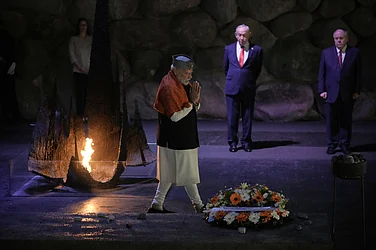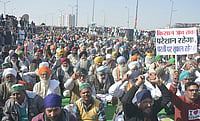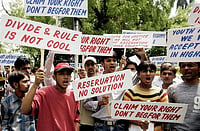A week after Hamas mounted an unprecedented all-out offensive that killed at least 1,300 and injured over 3,600 across Israel, the Israeli military appears set to launch a ground and naval offensive in Gaza Strip that seeks to, in the words of Defence Minister Yoav Gallant, wipe Hamas “off the face of the Earth”.
In its largest muster ever so far, the Israeli military has mobilised around 360,000 personnel, who are deployed along the Gaza and Lebonan borders. The Israeli Air Force (IAF) has continued to pound Gaza under ‘Operation Swords of Iron’ in response to the Hamas offensive dubbed ‘Operation Al Aqsa Storm’.
The Israeli military has started ‘localised raids’ in Gaza that are being seen as a precursor to the full offensive. The raiding soldiers looked for signs of captives and neutralised Hamas personnel and weaponry in the border region. While these limited special forces missions for reconnaissance or probing defences may be taking place, the Israeli leadership has not yet greenlit a full-fledged ground offensive — for good reasons.
There are around 150-200 hostages, including children, in Gaza with Hamas and aligned Palestinian groups that attacked Israel last Saturday. Hamas has already threatened their execution and Prime Minister Benjamin Netanyahu would not want to compromise them, knowing well the extent to which the designated terrorist group can go — last week it killed toddlers and paraded a seemingly dead woman in a semi-naked state in Gaza amid celebratory cheering. Such developments have deeply shocked the Israeli national conscience.
Hostages complicating Israeli invasion
The hostages have complicated the situation and are the reason that we are yet to see a full offensive in Gaza as neither Netanyahu nor US President Joe Biden would want to have them executed or killed in airstrikes, says West Asia and counter-terrorism expert Kabir Taneja of the think tank Observer Research Foundation (ORF).
“Hamas has already claimed that hostages have been killed in Israeli airstrikes, though it has not provided any evidence of it. Losing hostages in airstrikes would not look good for either Netanyahu or Biden and that’s the main reason we are seeing special forces operations for search of hostages or collection of intelligence and not a full invasion,” says Taneja, Fellow at ORF’s Strategic Studies Programme.
Besides hostages, there are also issues of an entrenched adversary in Gaza with months of planning and a real possibility of a multi-front war as Iran-backed groups in the region such as Hezbollah have already started clashing with Israel. The Israeli military is deployed along both the Gaza and Lebanon borders and a full-fledged multi-front war is the last thing it would want.
Taneja tells Outlook, “Israel is not in a position to open all the fronts. It would want to concentrate on Gaza instead of picking a fight with the wider Iranian ecosystem in the region. Even with regard to Gaza, we are yet to see the full intent of an invasion. We don’t know for sure what will happen, but we have to keep the centrality of hostages in mind.”
At the time of writing, the Israeli invasion looked imminent. The Israeli military on Saturday evening said it was ready for a “wide range of offensive operational plans” that would include a “joint and coordinated attack from the air, sea, and land”. While a ground operation was widely anticipated from the beginning, the indication of a naval element means that Israel is leaving no stone unturned in making this a big push against Hamas.
A week of Israeli bombing and special forces missions have, however, not deterred Hamas. The group has continued to launch rockets at Israel and now Hezbollah appears to be in the picture too, which launched dozens of attacks into Israel on Saturday alone. Attacks from Gaza also continued well into Saturday night, which has so far launched around 5,000 rockets into Israel and multiple rounds of ground attacks.

Qatar and Egypt have engaged in talks with Hamas for the release of hostages, at least of women or children at first, but Hamas appears to be intent on using them as leverage in the war. No agreement so far has been finalised and the continuous attacks suggest that it too, just like Israel, is in this for the long haul. After all, it’s not just Israel that has framed its offensive as the ‘final push’. Hamas Commander Mohammed Deif has termed his war on Israel as the “day of the greatest battle to end the last occupation on Earth”.
Pitched urban battles and humanitarian crisis
The evolving humanitarian situation in Gaza is also a critical factor in any decision of an invasion. The Gaza Strip is a densely populated region where pitched urban battles are expected to be fought. With months of planning, Hamas is bound to have boobytrapped the region and, with its strong network of underground tunnels and deep knowledge of the region, it is expected to be a formidable foe.
Taneja of ORF says it’s not certain if Netanyahu is in a position to absorb the toll that such a fight could bring.
“The urban warfare in Gaza in any ground invasion would also incur many casualties on the Israeli side. Is Netanyahu in a position to absorb that toll? The country is deeply angry at Hamas after its killings, but it is also very angry at Netanyahu,” says Taneja.
Even though Hamas said its offensive was in response to Jewish actions at the Al Aqsa Mosque, that’s certainly not the case. It had months of planning. Its attackers invaded Israel on bikes and trucks by land, on gliders by air, and on boats by sea. They had detailed knowledge of the places to attack for maximum damage and intelligence that has so far been gathered shows they prepared for the attacks with mock-ups of Israeli settlements. It’s evident in its actions of singling out unarmed civilians, including children that it killed and abducted.
It is the humanitarian situation in Gaza that is much more visible to the world where hundreds of thousands have been displaced and food, water, and medical supplies are running short. Latest figures show at least 2,200 Palestinians have been killed and over 8,000 are injured in Gaza in Israeli airstrikes, including civilians and several hundreds of children. Thousands of houses have been destroyed and dozens of schools and medical facilities have also been damaged.

The evolving humanitarian situation is key to continued support from the international community to Israel, says former Indian diplomat Anil Trigunayat.
“The casualties in the invasion of Gaza are going to be very large. The world cannot deny Israel its right to respond to the unprecedented attack on its soil, but the worsening humanitarian crisis would lead to the international community to eventually call for a halt to violence. It’s certain that Hamas is set to be decimated substantially, but it’s also certain that the region would be caught in a cycle of revenge and retribution,” says Trigunayat, a former Indian envoy to Jordan and Libya who currently serves as a Distinguished Fellow at the think tank Vivekananda International Foundation (VIF).
The humanitarian crisis is already at the fore of international engagement. US Secretary of State Antony Blinken has been in the region for three days to hold meetings with regional leaders and a plan has been worked out to provide supplies into Gaza and to allow for the passage of people out of Gaza, at least of foreign nationals at first.
Even Israel is cognisant of the humanitarian crisis. Despite its focus on decimating Hamas —multiple Hamas ministers and top commanders have been killed over the past week— it is engaged in talks over the humanitarian issue and its reasoning for the evacuation of North Gaza is to prevent any further collateral damage to the civilians in the fight between Hamas and the Israeli military.
President Biden has also separated Hamas from the Palestinians. While he has made it clear that the United States stands with Israel shoulder-to-shoulder and Blinken also said that “as long as there’s a United States, Israel will never be alone”, they have also spoken on the humanitarian situation both privately and publicly.
The Arab street, however, does not look kindly to the situation even if their leaders have for years favoured peace with Israel over championing the Palestinian cause.
“In the Arab world, the street is important, not the rulers. The street is highly critical of Israel at the moment. Israel would need a new strategy as the cycle of revenge and retribution would continue until a solution is found,” says Trigunayat.
Threat of a wider conflict, changing regional dynamics
Even though Israel would not want the ongoing fighting to turn into a multi-front conflict, there is a very real chance of it as Hezbollah has already joined the fighting and all Iran-backed non-state actors share one fundamental ideology: the destruction of Israel.
Hamas and Hezbollah have the destruction of Israel in their ideological charter and opposition to the State of Israel is in the fundamental tenets of the Islamic Revolution of Iran of 1979 that has shaped the current Iranian state. The revolution termed Israel a “cancerous tumour”.
“For Iran’s revolutionaries, Iraq was merely a proxy for the wider struggle against the ‘Great Satan’ and its allies, Saudi Arabia and that ‘cancerous tumour’, Israel. Indeed, the latter came to occupy a unique position in the ideology of the Islamic Revolution; successive Iranian leaders have rhetorically pledged to eradicate the ‘Zionist regime’ and diverted some of the country’s resources to proxy militias [Hamas, Hezbollah, etc] opposed to Israel in the region,” says a paper by Ali Ansari and Kasra Aarabi for the Tony Blair Institute for Global Change.
Containing any escalation from becoming a wider conflict with Iran would also be a challenge. Unlike Israel, which is a state concerned with national and regional consequences, Hamas is a designated terrorist group with little sense of consequences.
“The Palestinian movement had weakened over the years and there was lots of frustration with that. With its attack, Hamas has tried to assert itself as the sole Palestinian representative,” says Trigunayat of VIF.
Any destabilisation of regional dynamics would also suit Hamas and Iran, such as the derailment of Saudi-Israeli normalisation. Taneja of ORF tells Outlook that the Saudi-Israeli normalisation, for which both countries had aired the intent, has been the biggest sufferer in the war.
The normalisation of ties between Israel and Saudi Arabia, which appeared to be just a matter of time before the war began, is now off the table for the foreseeable future. The rising acceptance of Israel among the regional leadership has at times run counter to the sentiment on the Arab street. How Saudis navigate this crisis would also be a test for the country’s de facto ruler Mohammed bin Salman —MBS— and his hold on the country.
“The Friday sermons coming out of Saudi Arabia are very pro-Palestinian. MBS has tried to moderate the Saudi mosques and has gone after political Islam, such as the Muslim Brotherhood from which Hamas also emerged. The current episode is also a test for MBS and his vision for the country and the region. We would also see how secure he is within the House of Saud and whether he can get away with alienating the Arab street on the issue of Palestinians. For the time being, however, the Saudi-Israel normalisation is off the table,” says Taneja of ORF.

Trigunayat of VIF tells Outlook that while Bahrain and the United Arab Emirates (UAE) have normalised ties with Israel, how Saudi Arabia conducts itself as the custodians of the holiest mosques and the birthplace of Islam matters much more in the region.
The possibility of a multi-front conflict along with implications of any escalation on the regional peace programme would likely factor into any decision that the Netanyahu-led War Cabinet of Israel makes. Central, of course, is the issue of hostages. Israel is battered and is agonising in national humiliation. Netanyahu would not want another round of it if and when Hamas executes hostages or broadcasts their visuals to the world like in the case of the German woman paraded in Gaza. Not only that would be a massive propaganda victory for Hamas, but it could also make it harder for the Israeli leadership to exercise any restraint in the wake of heightening domestic pressure.
Even as the Israeli military makes the final preparations for an invasion of Gaza, Netanyahu faces these challenges in greenlighting any all-out offensive in Gaza. What calls he and those around him make in days to come could just reshape the region for the near future.






















